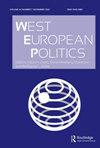更友善、更温和、更能抵御危机?共识民主、包容性机构与新冠肺炎疫情表现
IF 3.6
1区 社会学
Q1 POLITICAL SCIENCE
引用次数: 3
摘要
摘要哪种民主模式表现最好?尽管几十年来的研究传统相当有力地表明,协商一致的民主国家优于威斯敏斯特式的多数派民主国家,但之前的研究范围仅限于“正常时期”。在这篇文章中,新冠肺炎大流行的内生背景被用来研究所谓的共识优越性是否也适用于危机期间。据推测,除了共识民主之外,包容性机构——即内阁规模和利益集团社团主义——还能提高危机相关绩效。根据新的和原始的数据,横截面和分层时间序列回归分析表明,横向权力分享和部长人数大大降低了超额死亡率,而利益集团体系的结构没有影响。尽管既定的共识民主国家即使在危机期间也可以利用其固有的制度资产,但我们的研究结果表明,多数派制度作为一种补偿性的绩效提升工具,可以通过在内阁中增加更多部长来灵活应对危机引发的必要性。本文章由计算机程序翻译,如有差异,请以英文原文为准。
Kinder, gentler – and crisis-proof? Consensus democracy, inclusive institutions and COVID-19 pandemic performance
Abstract Which patterns of democracy perform best? Although a decades-long research tradition has fairly robustly suggested that consensual democracies outperform their Westminster-style majoritarian counterparts, the scope of previous studies has been limited to ‘normal times’. In this article, the endogenous context of the COVID-19 pandemic is leveraged to study whether the alleged superiority of consensualism also holds during crises. It is hypothesised that, in addition to consensus democracy, inclusive institutions – i.e. cabinet size and interest-group corporatism – enhance crisis-related performance. Drawing on new and original data, cross-sectional and hierarchical time-series regression analyses show that horizontal power-sharing and the number of ministers substantively reduced excess mortality, while the structure of the interest-group system had no effect. Although established consensus democracies can draw on their built-in institutional assets even during crises, our findings indicate that majoritarian systems may, as a compensatory performance-enhancing tool, flexibly gear up for crisis-induced necessities by adding more ministers to the cabinet.
求助全文
通过发布文献求助,成功后即可免费获取论文全文。
去求助
来源期刊

West European Politics
POLITICAL SCIENCE-
CiteScore
10.00
自引率
7.10%
发文量
58
期刊介绍:
West European Politics (WEP)has established itself as one of the most authoritative journals covering political and social issues in Western Europe. It has a substantial reviews section and coverage of all national elections in Western Europe. Its comprehensive scope, embracing all the major political and social developments in all West European countries, including the European Union, makes it essential reading for both political practitioners and academics.
 求助内容:
求助内容: 应助结果提醒方式:
应助结果提醒方式:


